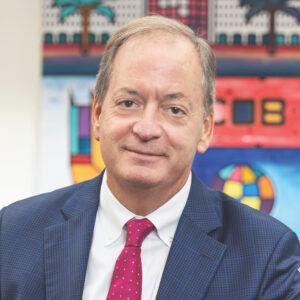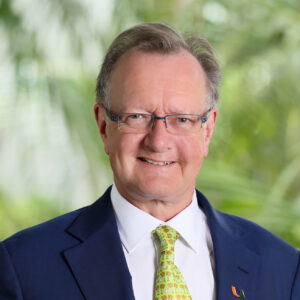Writer: Jerrica DuBois
 2 min read March 2023 — In 2023, business schools are tasked with not only educating, but doing so in an economic environment that can change rapidly. William Hardin, dean of FIU’s College of Business, and John Quelch, dean of University of Miami’s Herbert Business School, shared their key highlights and achievements with Invest: as well as their thoughts on student experience, curriculum and preparing their graduates for the working world.
2 min read March 2023 — In 2023, business schools are tasked with not only educating, but doing so in an economic environment that can change rapidly. William Hardin, dean of FIU’s College of Business, and John Quelch, dean of University of Miami’s Herbert Business School, shared their key highlights and achievements with Invest: as well as their thoughts on student experience, curriculum and preparing their graduates for the working world.
What have been some of the highlights and milestones for the business school in the past year?
William Hardin: A lot has been going on, but the key thing at the College of Business is that we were able to expand our footprint across multiple modalities. Every one of our graduate programs has an in-person and online modality. We have been doing this for more than two decades, and it is not new for us, but we are now able to meet students where they need and want to be. The pandemic has shown us that location and place are incredibly important, but also so is agility and flexibility. We are addressing these issues of flexibility, as it encompasses location and time frames across a continuum that can work for everyone. We have also added new programs including an MBA in Cybersecurity and in Analytics.
 John Quelch: We were ranked No. 5 in the United States for our company-specific executive education programs by the Financial Times of London. We only do company-specific customized programs. We offer no open enrollment programs. Companies contract with us individually to develop a specialized program that meets their needs. Over the last five years, our undergraduate business ranking from the agency Poets&Quants has improved from 49 to 30, which is a very substantial increase. We were also named the No. 1 MBA school in the world for teaching business law, also by the Financial Times of London. This semester, we have welcomed the largest number of new faculty in the history of the school, all coming from esteemed institutions such as Chicago, MIT, NYU and Yale. The business school now has approximately 4,200 students. This year’s freshman intake into the business school is larger than for the College of Arts and Sciences at the University of Miami.
John Quelch: We were ranked No. 5 in the United States for our company-specific executive education programs by the Financial Times of London. We only do company-specific customized programs. We offer no open enrollment programs. Companies contract with us individually to develop a specialized program that meets their needs. Over the last five years, our undergraduate business ranking from the agency Poets&Quants has improved from 49 to 30, which is a very substantial increase. We were also named the No. 1 MBA school in the world for teaching business law, also by the Financial Times of London. This semester, we have welcomed the largest number of new faculty in the history of the school, all coming from esteemed institutions such as Chicago, MIT, NYU and Yale. The business school now has approximately 4,200 students. This year’s freshman intake into the business school is larger than for the College of Arts and Sciences at the University of Miami.
What is unique about your international business program?
Hardin: It isn’t just the program, but it is the recognition that most businesses have an international component. Every one of our disciplines has an international class or aspect to it. Students need to be exposed to the fact that there are people from everywhere in Miami and that business happens across country lines. We create an environment that works, and we attract people that want to be in a multinational, diverse environment. Our students are from all over and are either international students or have an international background. A student may be born in Miami, but their parents are from Cuba, Brazil or Colombia, so there are many connections. We are fostering a global mindset through our program.
What are students now looking for from their college experience?
Quelch: Business school students have always expected their investment in education to accelerate their opportunity to exceed their potential. They expect to identify a career path that is better than they anticipated or would have had if they had not gone to business school. Nothing has altered this core expectation; they want a return on their investment. What has changed is that employers now are not just looking for technically well-trained people but people whom they can “plug and play” in their organizations almost immediately upon recruitment. They look for people who understand how organizations work, the politics, how to make something happen and how to curate ideas properly.
What is the key to retaining students in Miami after graduation?
Hardin: Everybody’s point of reference is the increase in interest rates. We ensure our clients comply with the tax code and relevant accounting standards. We take our role as advisors seriously, anticipating future economic struggles with inflation as we recover from the pandemic. We approach this through frequent communications, proactive discussions and strategic meetings to help our clients prepare. It’s about an ability to pivot and to flush out contingency planning. The economic projection shows that we may be going into recession, but our client base is positioned well to succeed, stay relevant and continue operations. We advise our clients on reducing costs where feasible without disrupting operations. From payroll to reducing or delaying capital investments or even curtailing some of their variable costs, which could be controlled by delaying expansions into new markets or maximizing efficiencies through technology and alternative models, we want our clients to rely on our professionals for impactful counsel in every economic cycle.
What are some of the key partnerships that you have with the business community in South Florida?
Quelch: We have a very strong corporate program with over 60 companies as members. They sponsor our conferences, recruit our students, provide projects and internships and their executives are often guest speakers in our classrooms. Most of these companies are based in South Florida and we nurture a multifaceted, symbiotic relationship with them in order to keep talent in the region after graduation.
For more information, visit:

